World Peace, brought to you by the League of Nations and the United Nations, unless the U.S. has anything to say about it!
The League of Nations was an intergovernmental organization founded on 10 January 1920 as a result of the Paris Peace Conference that ended the First World War. It was the first international organization whose principal mission was to maintain world peace. Its primary goals, as stated in its Covenant, included preventing wars through collective security and disarmament and settling international disputes through negotiation and arbitration. Other issues in this and related treaties included labor conditions, just treatment of native inhabitants, human and drug trafficking, the arms trade, global health, prisoners of war, and protection of minorities in Europe. At its greatest extent from 28 September 1934 to 23 February 1935, it had 58 members.
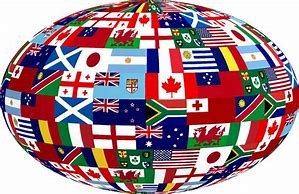
Woodrow Wilson, an American statesman and academic who served as the 28th President of the United States from 1913 to 1921. As president, he oversaw the passage of progressive legislative policies unparalleled until the New Deal in 1933. He was one of the three key world leaders at the 1919 Paris Peace Conference where he secured accommodation on major issues and won preliminary acceptance of the League of Nations. The Palais Wilson on Geneva's western lakeshore, named after US President Woodrow Wilson in recognition of his efforts towards the establishment of the League, was the League's first permanent home. For his peace-making efforts, Wilson was awarded the 1919 Nobel Peace Prize. Scholars and historians generally rank Wilson as one of the best U.S. presidents, but he was unable to win Senate approval for U.S. participation in the League. The power of the League was limited by the United States' refusal to join.
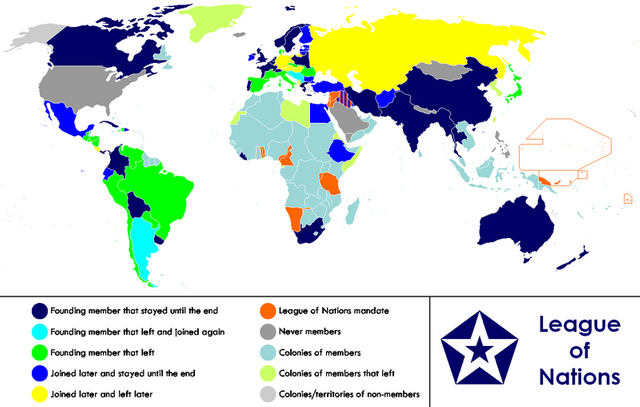
The diplomatic philosophy behind the League represented a fundamental shift from the preceding hundred years. The League lacked its own armed force and depended on the victorious Great Powers of World War I to enforce its resolutions, keep to its economic sanctions, or provide an army when needed. The Great Powers were often reluctant to do so. Sanctions could hurt League members, so they were reluctant to comply with them. The Soviet Union became a member on 18 September 1934, and was expelled on 14 December 1939 for invading Finland. In expelling the Soviet Union, the League broke its own rule with only 7 of 15 members of the Council voted for expulsion, short of the majority required by the Covenant. Three of these members had been made Council members the day before the vote. This was one of the League's final acts before it practically ceased functioning due to the Second World War.
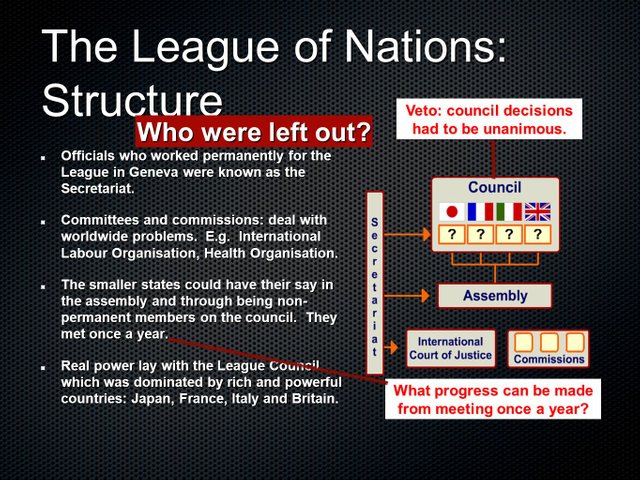
The onset of the Second World War demonstrated that the League had failed in its primary purpose, the prevention of another world war. There were a variety of reasons for this failure, many connected to general weaknesses within the organization. After some notable successes and some early failures in the 1920s, the League ultimately proved incapable of preventing aggression by the Axis powers in the 1930s. The credibility of the organization was weakened by the fact that the United States never officially joined the League and the Soviet Union joined late and only briefly. The League lasted for 26 years and then the United Nations replaced it after the end of the Second World War. The United Nations inherited several agencies and organizations founded by the League.
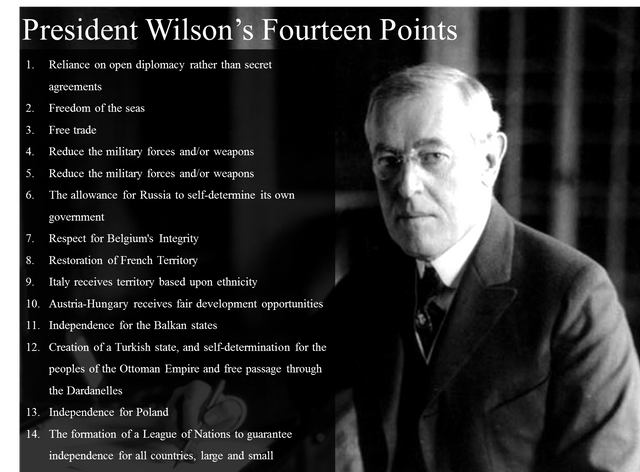
The archive of the League of Nations was transferred to the United Nations Office at Geneva and is now an entry in the UNESCO Memory of the World Register. In the past few decades, by research using the League Archives at Geneva, historians have reviewed the legacy of the League of Nations as the United Nations has faced similar troubles to those of the interwar period. Current consensus views that, even though the League failed to achieve its ultimate goal of world peace, it did manage to build new roads towards expanding the rule of law across the globe; strengthened the concept of collective security, giving a voice to smaller nations; helped to raise awareness to problems like epidemics, slavery, child labor, colonial tyranny, refugee crisis and general working conditions through its numerous commissions and committees; and paved the way for new forms of statehood, as the mandate system put the colonial powers under international observation.
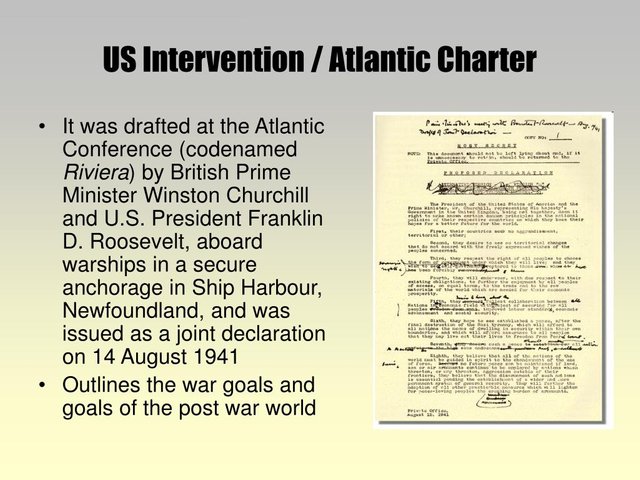
The Atlantic Charter was a pivotal policy statement issued on 14 August 1941, which defined the Allied goals for the post war world four months before the U.S. official entered the war. The leaders of the United Kingdom and the United States drafted the work and all the Allies of World War II later confirmed it. The Charter stated the ideal goals of the war—no territorial aggrandizement; no territorial changes made against the wishes of the people, self-determination; restoration of self-government to those deprived of it; reduction of trade restrictions; global cooperation to secure better economic and social conditions for all; freedom from fear and want; freedom of the seas; and abandonment of the use of force, as well as disarmament of aggressor nations. No signed version ever existed. The document was threshed out through several drafts and the final agreed text was telegraphed to London and Washington. President Roosevelt gave Congress the Charter's content on 21 August 1941. The Atlantic Charter set goals for the postwar world and inspired many of the international agreements that shaped the world thereafter.
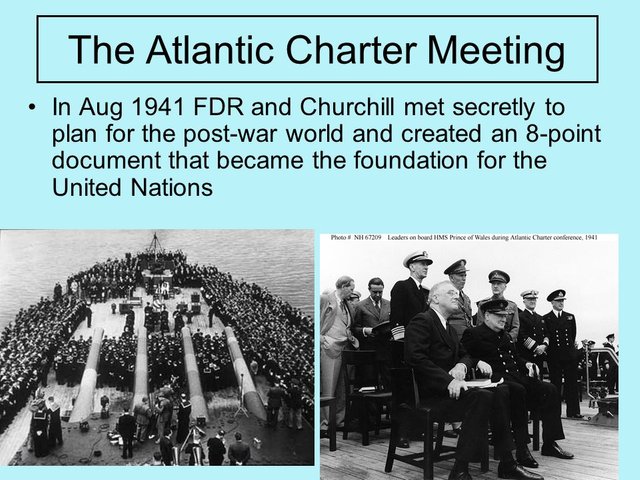
The eight principal points of the Charter were:
- no territorial gains were to be sought by the United States or the United Kingdom;
- territorial adjustments must be in accord with the wishes of the peoples concerned;
- all people had a right to self-determination;
- trade barriers were to be lowered;
- there was to be global economic cooperation and advancement of social welfare;
- the participants would work for a world free of want and fear;
- the participants would work for freedom of the seas;
- there was to be disarmament of aggressor nations, and a common disarmament after the war.
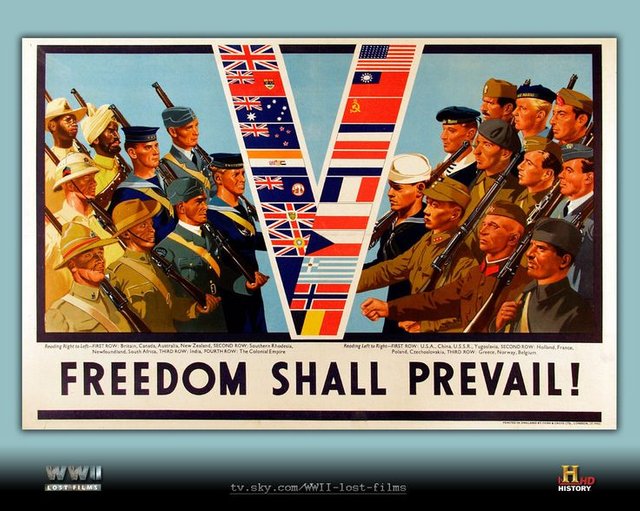
During the war, the United Nations became the official term for the Allies. To join countries had to sign the Declaration and declare war on the Axis. One major change from the Atlantic Charter was the addition of a provision for religious freedom. The earliest concrete plan for a new world organization to replace the ineffective League of Nations began under the aegis of the US State Department in 1939. On 12 June 1941, representatives met in London and signed the Declaration of St. James's Palace. This was the first of six conferences that led up to the founding of the United Nations and the Charter of the United Nations. U.S. President Franklin Roosevelt first suggested using the name United Nations, to refer to the Allies of World War II, to British Prime Minister Winston Churchill during the latter's three-week visit to the White House in December 1941. Roosevelt suggested the name as an alternative to "Associated Powers", a term the U.S. used in the First World War (the U.S. was never formally a member of the Allies of World War I but entered the war in 1917 as a self-styled "Associated Power"). The first official use of the term "United Nations" was on 1–2 January 1942 when 26 Governments signed the Declaration. By early 1945 it had been signed by 21 more states.
MEMBER STATES OF THE UNITED NATIONS TODAY
.svg.png)
A JOINT DECLARATION BY ... (Member Nations) Government signatory hereto,
Having subscribed to a common program of purposes and principles embodied in the Joint Declaration of the President of the United States of America and the Prime Minister of Great Britain dated August 14, 1941, known as the Atlantic Charter,
Being convinced that complete victory over their enemies is essential to defend life, liberty, independence and religious freedom, and to preserve human rights and justice in their own lands as well as in other lands, and that they are now engaged in a common struggle against savage and brutal forces seeking to subjugate the world,
DO HEREBY DECLARE:
(1) Each Government pledges itself to employ its full resources, military or economic, against those members of the Tripartite Pact and its adherents with which such government is at war.
(2) Each Government pledges itself to cooperate with the Governments signatory hereto and not to make a separate armistice or peace with the enemies.
The foregoing declaration may be adhered to by other nations which are, or which may be, rendering material assistance and contributions in the struggle for victory over Hitlerism.
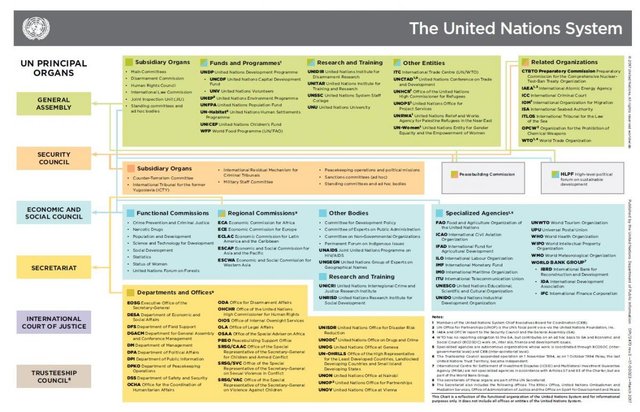
The basic constitutional makeup of the United Nations has changed little, though vastly increased membership has altered the functioning of some elements. The UN as a whole has generated a rich assortment of non-governmental organizations and special bodies over the years: some with a regional focus, some specific to the various peacekeeping missions, and others of global scope and importance.
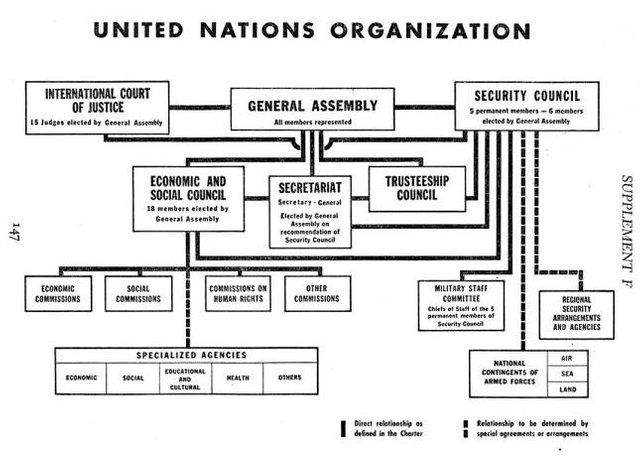
The United States, Britain, Soviet Union and China made the major decisions and became permanent members of the all-powerful Security Council. Roosevelt made sure that each (including France) had a veto power, thus avoiding the fatal weakness of the League of Nations, which theoretically could order its members to act in defiance of their own parliaments. The main inspiration for the United Nations was the League of Nations with the goal to rectify the League’s imperfections in order to create an organization that would be “the primary vehicle for maintaining peace and stability. It is interesting to note that “Roosevelt saw the United Nations as the crowning achievement of his political career.”
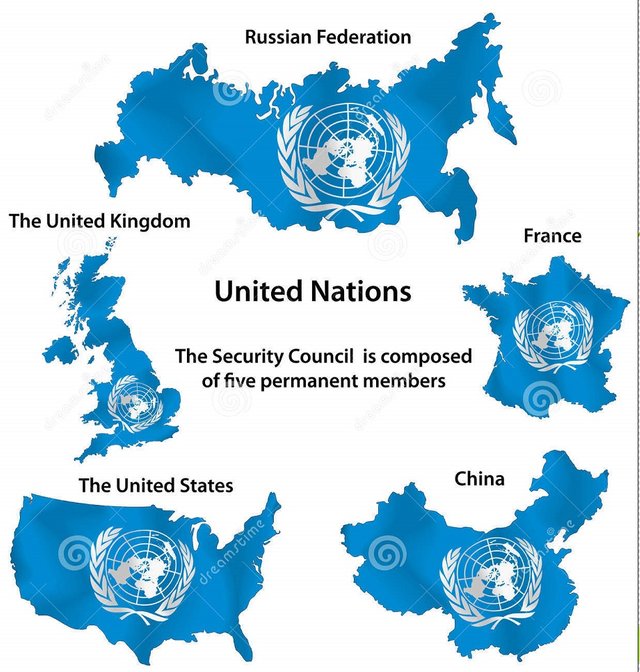
The United Nations has achieved considerable prominence in the social arena, fostering human rights, economic development, decolonization, health and education, for example, and interesting itself in refugees and trade. Following the end of the Cold War, renewed calls arose for the UN to become the agency for achieving world peace and co-operation, as several dozen active military conflicts continued to rage across the globe. The breakup of the Soviet Union left the United States in a unique position of global dominance, creating a variety of new problems for the UN.
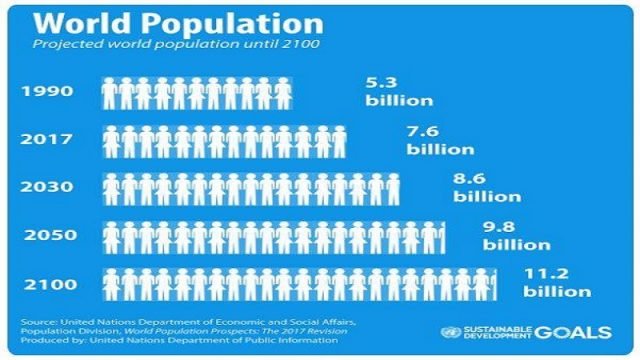
Sources:
https://en.wikipedia.org/wiki/Woodrow_Wilson
https://en.wikipedia.org/wiki/League_of_Nations
https://en.wikipedia.org/wiki/Atlantic_Charter
https://en.wikipedia.org/wiki/United_Nations
https://en.wikipedia.org/wiki/History_of_the_United_Nations
https://en.wikipedia.org/wiki/United_States_and_the_United_Nations
CONCLUSION: The reasons for the creation of the League of Nations is as real today as it ever was. The United Nations needs the support of all nations to function and to be able to accomplish the mandate. The United States failure to participate in the League of Nations was the preeminent reason for the inability of the league to avoid World War I. Although the United States was instrumental in the formation of the United Nations and provides a significant percentage of the operating budget, the U.S. Congress has refused to authorize payment of the UN dues, in order to force UN compliance with U.S. wishes, as well as a reduction in the U.S. assessment. The United States as the world's dominant military, economic, social, and political power the most significant challenge for the UN in recent times has been that of the United States. The United Nations was not designed for such a unipolar world with a single superpower, and conflicts between an ascendant U.S. and other UN members has increased. Diplomatically the United States will continue manipulate the United Nations until the United Nations can operate without the need for U.S. financing. With the creation of crypto-currencies worldwide, would a single source United Nations controlled crypto-currency allow the UN to operate without outside financing?
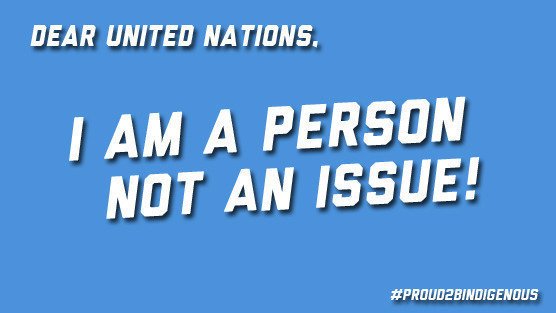
It's pretty telling that UN headquarters is located in New York.
But I mean if we wanted true equality I suppose it would have to be located on the moon :)